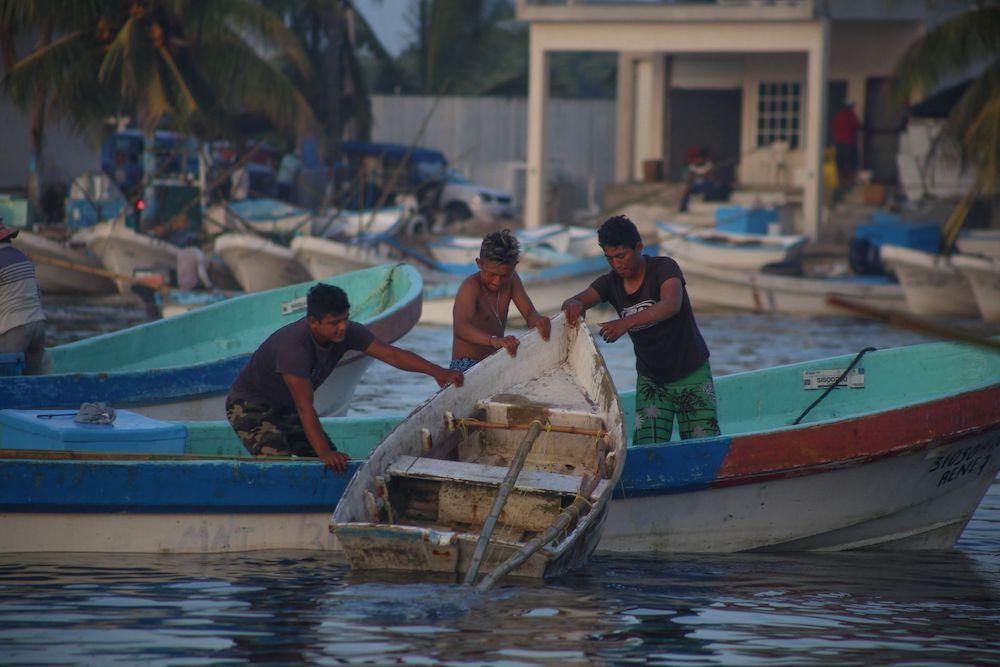The last few years have been very difficult for coastal communities that depend on marine resources in Mexico, which emphasizes the urgency of supporting strategies that help them recover and plan for a better future. In addition to the health and economic impacts of the COVID-19 pandemic, these communities have been affected by the increasingly obvious effects of climate change. The most intense and frequent hurricanes have caused damage and deaths along coastal areas where floods have penetrated into areas previously unthinkable. Red tides cause massive fish deaths off the Yucatan coast, while on the Mexican Caribbean coast a dense layer of sargassum clouds the crystal clear waters where they fish for lobster. Along the Mexican North Pacific coast and within the Gulf of California, ocean warming and low oxygen have caused valuable populations of abalone and giant squid to decline.
People who fish are not one to sit idly by and more than once they have been able to adjust to correct the course. Faced with the challenges of climate change, they participate in monitoring programs where they collect data on sea conditions and document changes in marine species. They are also looking for allies to improve their fishing practices and find new markets that value other species in order to continue their livelihoods in a sustainable way. However, there has been a lack of governance policies that make good use of government institutions to integrate this information into science-based management plans and design measures to adapt to climate change.
Recent years have seen the disappearances, disqualifications, or weakening of the National Institute for Ecology and Climate Change (INECC), the National Institute for Fisheries and Aquaculture (INAPESCA), the Mexican Institute of Water Technology (IMTA), and even the recent politicization of the National Commission for the Knowledge and Use of Biodiversity (CONABIO). The country's fishing communities cannot be abandoned in the face of the onslaught of climate change and illegal fishing. The country's food security and the socio-economic well-being of more than 300,000 families now and many others in the future depend on this.
Many fishing cooperatives have taken the initiative to self-regulate their fishing and to establish fishing shelters to reduce pressure on marine ecosystems and help species already affected by climate change to recover. Meanwhile, an exponential increase in illegal fishing across the country and the lack of action by the authorities undermine the effectiveness of these community initiatives.
Vulnerability factors in fishing and aquaculture communities are known and there are already projections of where marine species will move in the country, including those of greatest commercial interest. Now what is needed is action!
First, we must ensure the inclusive participation of fishing communities in decision-making spaces. This is essential for the people most affected to have a voice in defining what adaptation policies would work and how they are going to be implemented. However, we must avoid that mere dialogue is confused with action, or that action is left only in dialogue.
First of all, in Mexico it is necessary to establish a National Program for Fisheries and Climate Change, with a vision beyond an electoral cycle, that links sustainable fisheries management with the instruments of climate policy and social justice. In parallel, federal and state governments must establish contingency and fund plans, including supporting alternative activities in and out of water to minimize economic and social impacts. This can make good use of the recent work of INAPESCA together with other researchers on climate change, and this scientific information must be used within public policies.
Second, capacity building will allow fisheries organizations to be better prepared to identify a variety of adaptation strategies that allow them to anticipate and respond to the impacts of climate change. For example, the Santa Cruz de Miramar cooperative in Nayarit has managed to establish quotas and catch times to maximize value for its community, even in the midst of pressures from pollution and illegal fishing. In Quintana Roo, lobster cooperatives have established monitored capture zones to know at the same time what trends are being seen in their reef systems. And in Baja Norte, FEDECOOP has imposed self-catch limits to prevent overfishing of abalone. In September 2022, six CONMECOOP cooperatives began participating in a capacity-building program for greater participation of fishermen in the national council and state fisheries committees. The idea in all these cases is to support management strategies to address the most important problems, stabilize catches and thus reduce the impacts of climate change on these communities.
Finally, we must continue to emphasize the fundamental role of the government in making good use of the enormous capacity and knowledge we have in Mexico. Fishermen can point out where and when illegal fishing occurs, but they cannot and should not face it alone, they need the support of the authorities. Scientists can predict where species will move as the sea warms, but they can't change management regulations. The Navy can monitor the coasts, but it cannot and should not establish the legal processes to govern our seas. The creation and implementation of public policies are the responsibility of the government and the government must act taking into account all the various actors that comprise it.
Technology, traditional knowledge and collaborative networks are all ready, only political will is required to let them act and give them certainty that their initiatives will be supported. The leadership of the Mexican government will decide if fishermen will be able to survive the next weather event with the wind in full force, or if they will let themselves be carried away by the current.
A lot of work remains to be done, but it's well worth the effort. Getting in on the action is the easy part.



Comentarios (0)